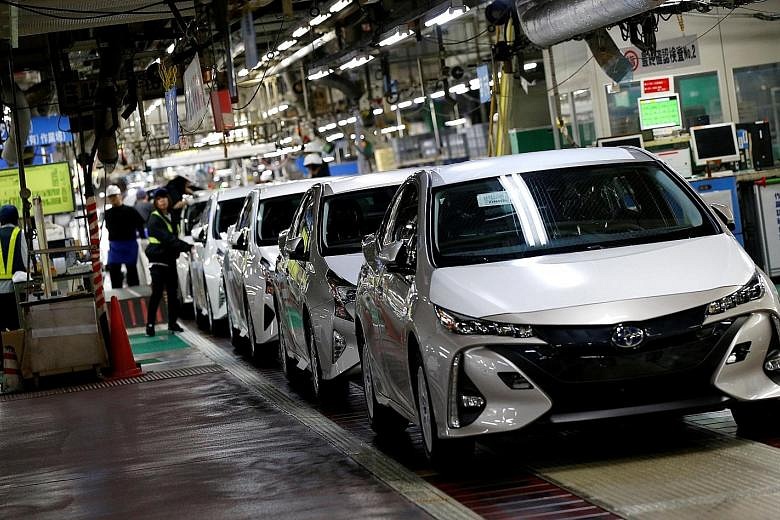NEW YORK • Toyota Motor is set to pay a US$180 million (S$238.9 million) fine for longstanding violations of the Clean Air Act, the US Attorney's Office in Manhattan announced on Thursday, the largest civil penalty to be levied for a breach of federal emissions-reporting requirements.
From about 2005 to 2015, the global carmaker systematically failed to report defects that interfered with how its cars controlled tailpipe emissions, violating standards designed to protect public health and the environment from harmful air pollutants, according to a complaint filed in Manhattan.
Toyota managers and staff in Japan knew about the practice but failed to stop it, and the carmaker quite likely sold millions of vehicles with the defects, the Attorney's Office said.
"Toyota shut its eyes to the noncompliance," acting US attorney Audrey Strauss said in a statement. Toyota has agreed not to contest the fine.
Mr Eric Booth, a spokesman for the carmaker, said that the company had alerted the authorities as soon as the lapses came to light, and that the delay in reporting "resulted in a negligible emissions impact, if any".
"Nonetheless, we recognise that some of our reporting protocols fell short of our own high standards, and we are pleased to have resolved this matter," Mr Booth added.
Toyota is the world's second-largest carmaker behind Volkswagen, and once built a reputation for clean technology on the back of its best-selling Prius gasoline-electric hybrid passengers cars. But the car giant's decision in 2019 to support the Trump administration's rollback of tailpipe emissions standards - coupled with its relatively slow introduction of fully electric vehicles - has made it a target of criticism from environmental groups.
Toyota's more recent line-up of models has been heavy on gas-guzzling sport utility vehicles, which come with far bigger price tags and have brought far higher profit margins.
According to a recent report from the Environmental Protection Agency, Toyota vehicles delivered some of the worst fuel efficiency in the industry, leading to an overall worsening of mileage and pollution from passenger cars and trucks in the United States for the first time in five years.
Many carmakers are now bracing themselves for a likely push by the incoming Biden administration for a return to stricter tailpipe emissions rules, and have signalled they are committed to working with administration officials.
"It's appalling that auto companies cheat on pollution rules but then want (President-elect Joe Biden) to negotiate with them about new clean car standards," said Mr Dan Becker, who directs the Safe Climate Transport Campaign at the Centre for Biological Diversity, an environmental group. "After reneging on their previous commitments, why should anyone trust the automakers?"
The car industry has been plagued by emissions-related scandals in recent years. In 2017, Volkswagen pleaded guilty to conspiring to defraud the US government after it acknowledged that it had rigged its diesel-powered cars to meet air-quality standards while being tested, even though the cars exceeded those standards in regular driving.
Last year, Daimler, another German carmaker, agreed to pay US$2.2 billion to settle accusations that Mercedes-Benz cars and vans sold in the US were programmed to cheat on emissions tests.
Car owners themselves have also been accused of tampering with their vehicles. A federal report concluded this year that owners and operators of more than half a million diesel pickup trucks have been illegally disabling the emissions control technology in their vehicles over the past decade, allowing excess emissions equivalent to nine million extra trucks on the road.
Transportation, which remains heavily dependent on fossil fuels, makes up the biggest chunk of emissions of planet-warming emissions, ahead of emissions generated by the power sector, manufacturing or agriculture. Scientists have long warned that the world's cars and trucks must move away from petrol to avoid the worst effects of climate change.
Recent estimates have shown that transportation-related emissions in the US did decline almost 15 per cent last year, as millions of people stopped driving to work and airlines cancelled flights.
But experts warn that emissions from cars and trucks will rebound unless policymakers take stronger action to keep emissions low.
NYTIMES

